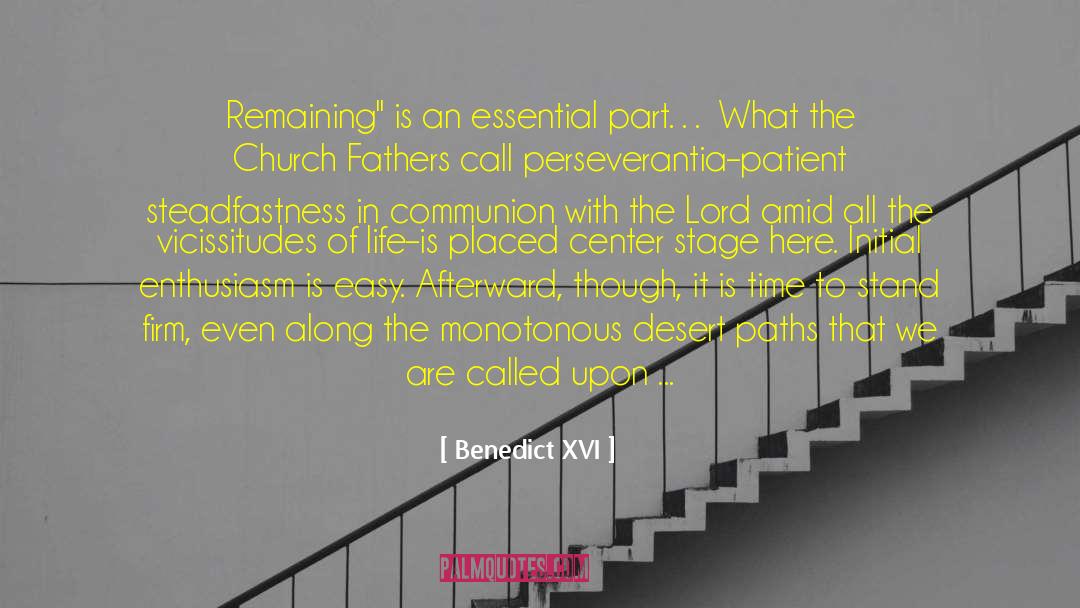Benedict XVI Famous Quotes
Reading Benedict XVI quotes, download and share images of famous quotes by Benedict XVI. Righ click to see or save pictures of Benedict XVI quotes that you can use as your wallpaper for free.
Whether it is Bach or Mozart that we hear in church, we have a sense in either case of what gloria Dei, the glory of God, means. The mystery of infinite beauty is there and enables us to experience the presence of God more truly and vividly than in many sermons. But there are already signs of danger to come. Subjective experience and passion are still held in check by the order of the musical universe, reflecting as it does the order of the divine creation itself. But there is already the threat of invasion by the virtuoso mentality, the vanity of technique, which is no longer the servant of the whole but wants to push itself to the fore. During the nineteenth century, the century of self-emancipating subjectivity, this led in many places to the obscuring of the sacred by the operatic. The dangers that had forced the Council of Trent to intervene were back again. In similar fashion, Pope Pius X tried to remove the operatic element from the liturgy and declared Gregorian chant and the great polyphony of the age of the Catholic Reformation (of which Palestrina was the outstanding representative) to be the standard for liturgical music. A clear distinction was made between liturgical music and religious music in general, just as visual art in the liturgy has to conform to different standards from those employed in religious art in general. Art in the liturgy has a very specific responsibility, and precisely as such does it serve as a wellspring of culture, which in the final ana
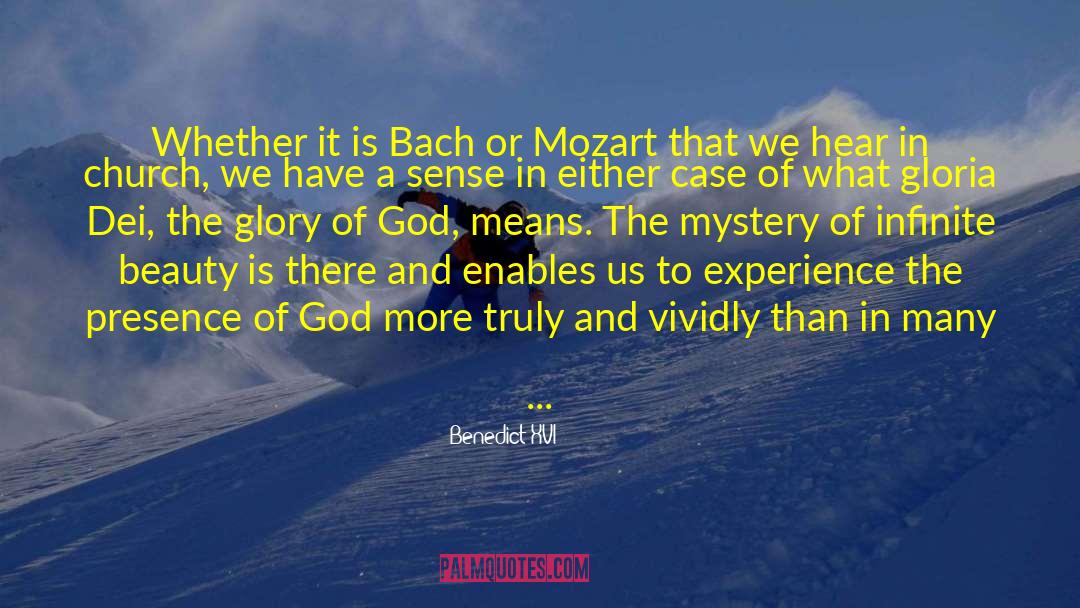
Are we not perhaps all afraid in some way? If we let Christ enter fully into our lives, if we open ourselves totally to him, are we not afraid that He might take something away from us? Are we not perhaps afraid to give up something significant, something unique, something that makes life so beautiful? Do we not then risk ending up diminished and deprived of our freedom? . . . No! If we let Christ into our lives, we lose nothing, nothing, absolutely nothing of what makes life free, beautiful and great. No! Only in this friendship are the doors of life opened wide. Only in this friendship is the great potential of human existence truly revealed. Only in this friendship do we experience beauty and liberation. And so, today, with great strength and great conviction, on the basis of long personal experience of life, I say to you, dear young people: Do not be afraid of Christ! He takes nothing away, and he gives you everything. When we give ourselves to him, we receive a hundredfold in return. Yes, open, open wide the doors to Christ – and you will find true life. Amen.
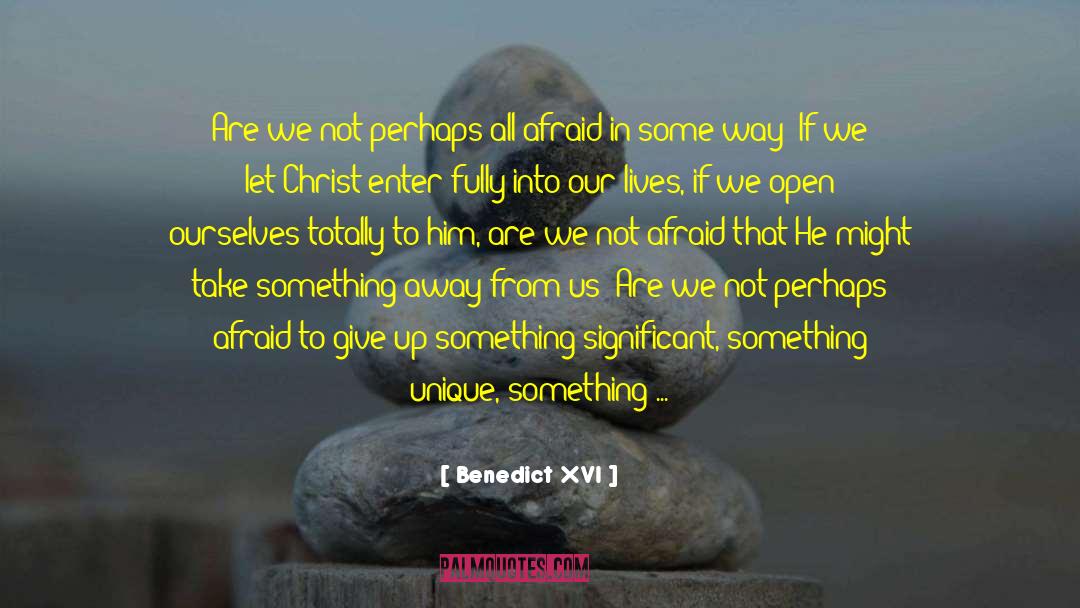
The unrealistic demand that everything the Church teaches be lived completely and in all its fullness fails to take into account humanity as it actually is...There exists in every man a certain tension between that which the Church recognizes as what the Christian ought to be and do and that which the average Christian normally achieves.
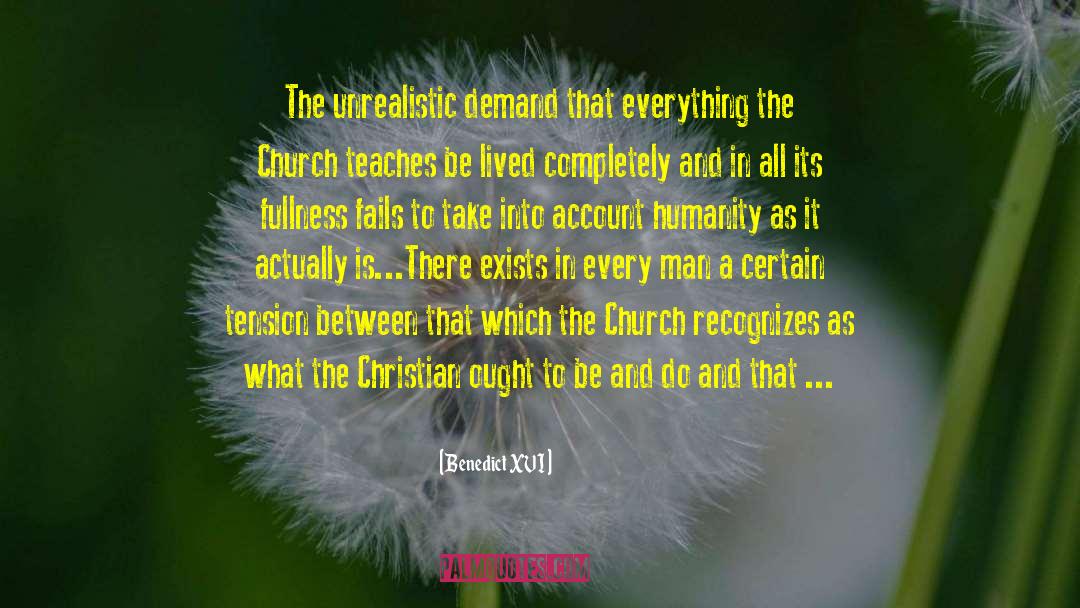
How many winds of doctrine we have known in recent decades, how many ideological currents, how many ways of thinking. The small boat of thought of many Christians has often been tossed about by these waves - thrown from one extreme to the other: from Marxism to liberalism, even to libertinism; from collectivism to radical individualism; from atheism to a vague religious mysticism; from agnosticism to syncretism, and so forth. Every day new sects are created and what Saint Paul says about human trickery comes true, with cunning which tries to draw those into error (cf Ephesians 4, 14). Having a clear Faith, based on the Creed of the Church, is often labeled today as a fundamentalism. Whereas, relativism, which is letting oneself be tossed and 'swept along by every wind of teaching', looks like the only attitude acceptable to today's standards. We are moving towards a dictatorship of relativism which does not recognize anything as certain and which has as its highest goal one's own ego and one's own desires. However, we have a different goal: the Son of God, true man. He is the measure of true humanism. Being an 'Adult' means having a faith which does not follow the waves of today's fashions or the latest novelties. A faith which is deeply rooted in friendship with Christ is adult and mature. It is this friendship which opens us up to all that is good and gives us the knowledge to judge true from false, and deceit from truth.
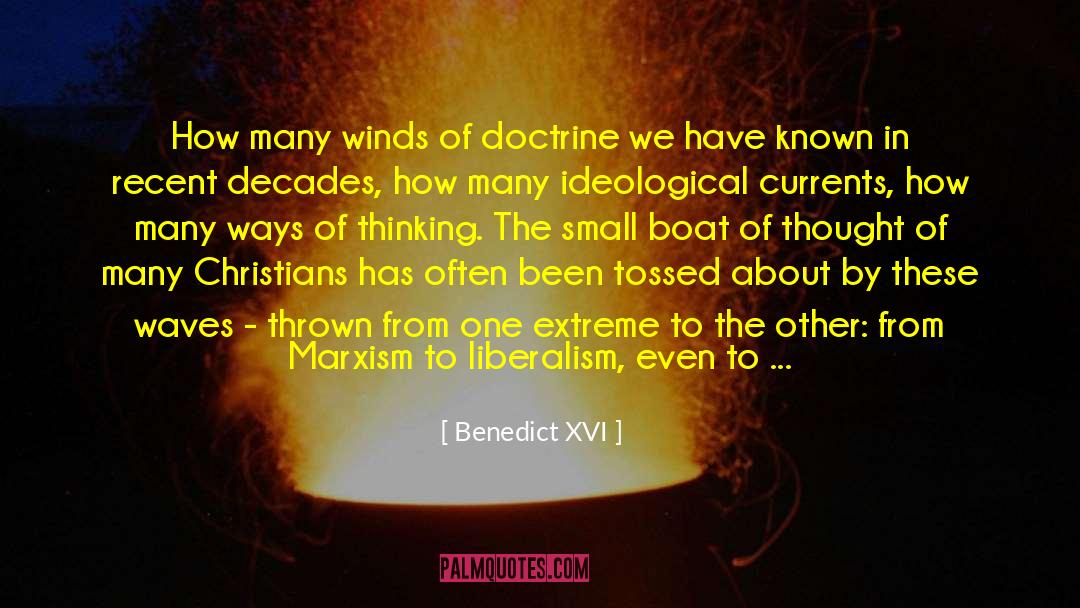
It is perhaps permissible here to draw attention to a distinction made by Martin Heidegger, who speaks of the duality of calculating and reflective thought. Both modes of thought are legitimate and necessary, but for this very reason neither can be absorbed in the other. There must therefore be both: calculating thought, which is concerned with "makability," and reflective thought, which is concerned with meaning. And one cannot deny that the Freiburg philosopher has a good deal of justification for expressing the fear that in an age in which calculating thought is celebrating the most amazing triumphs man is nevertheless threatened, perhaps more than ever before by thoughtlessness, by the flight from thought. By thinking only of the practicable, of what can be made, he is in danger of forgetting to reflect on himself and on the meaning of his existence. Of course, this temptation is present in every age. Thus in the thirteenth century the great Franciscan theologian Bonaventure felt obliged to reproach his colleagues of the philosophical faculty at Paris with having learned how to measure the world but having forgotten how to measure themselves.

The intellectual climate of the 1970s, for which the 1950s had already paved the way, contributed to this. A theory was even finally developed at that time that pedophilia should be viewed as something positive. Above all, however, the thesis was advocated-and this even infiltrated Catholic moral theology-that there was no such thing as something that is bad in itself. There were only things that were "relatively" bad. What was good or bad depended on the consequences.
In such a context, where everything is relative and nothing intrinsically evil exists, but only relative good and relative evil, people who have an inclination to such behavior are left without no solid footing. Of course pedophilia is first rather a sickness of individuals, but the fact that it could become so active and so widespread was linked also to an intellectual climate through which the foundations of moral theology, good and evil, became open to question in the Church. Good and evil became interchangeable; they were no longer absolutely clear opposites.
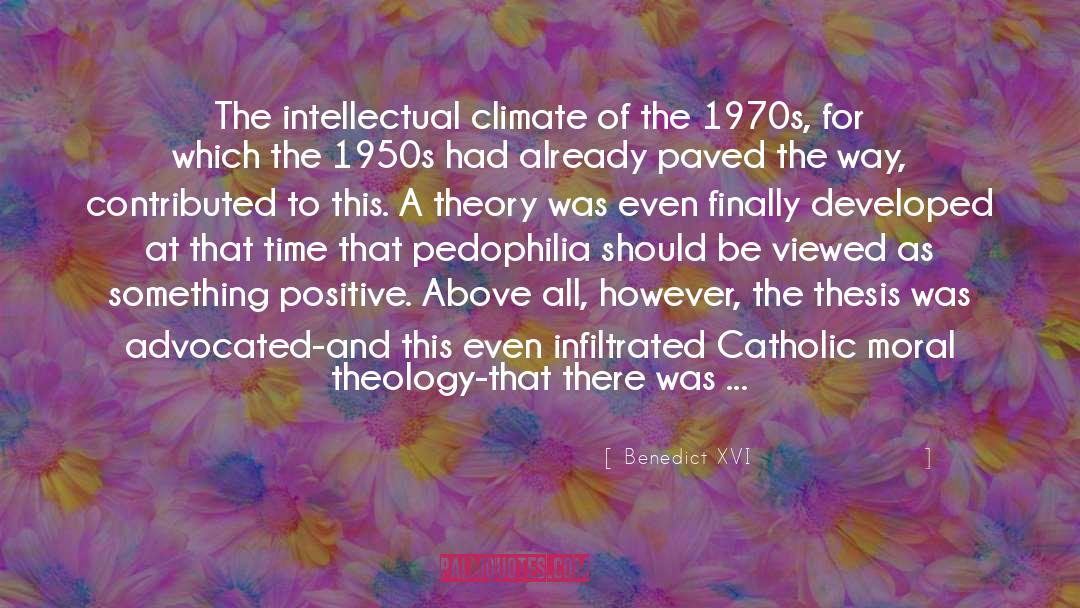
It is obvious that the concept of truth has become suspect. Of course it is correct that is has been much abused. Intolerance and cruelty have occurred in the name of truth. To that extent people are afraid when someone says, "This is the truth", or even "I have the truth". We never have it, at best is has us. No one will dispute that one must be careful and cautious in claiming the truth. But simply to dismiss it as unattainable is really destructive.
(...) We must have the courage to dare to say: Yes, man must seek the truth; he is capable of truth. It goes without saying that truth requires criteria for verification and falsification. It must always be accompanied by tolerance, also. But then truth also points out to us those constant values which have made mankind great. That is why the humility to recognize the truth and to accept it as a standard has to be relearned and practiced again.
The truth comes to rule, not through violence, but rather through its own power; this is the central theme of John's Gospel: When brought before Pilate, Jesus professes that he himself is The Truth and the witness to the truth. He does not defend the truth with legions but rather makes it visible through his Passion and thereby also implements it.
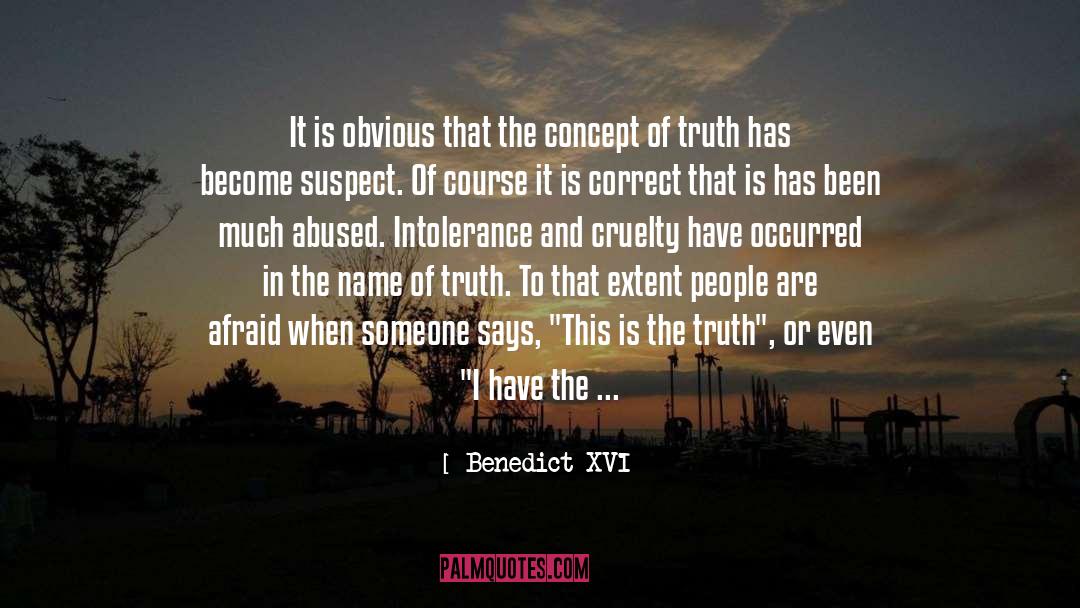
What happened after the Council was totally different: in the place of liturgy as the fruit of development came fabricated liturgy. We left the living process of growth and development to enter the realm of fabrication. There was no longer a desire to continue developing and maturing, as the centuries passed and so this was replaced - as if it were a technical production - with a construction, a banal on-the-spot product.
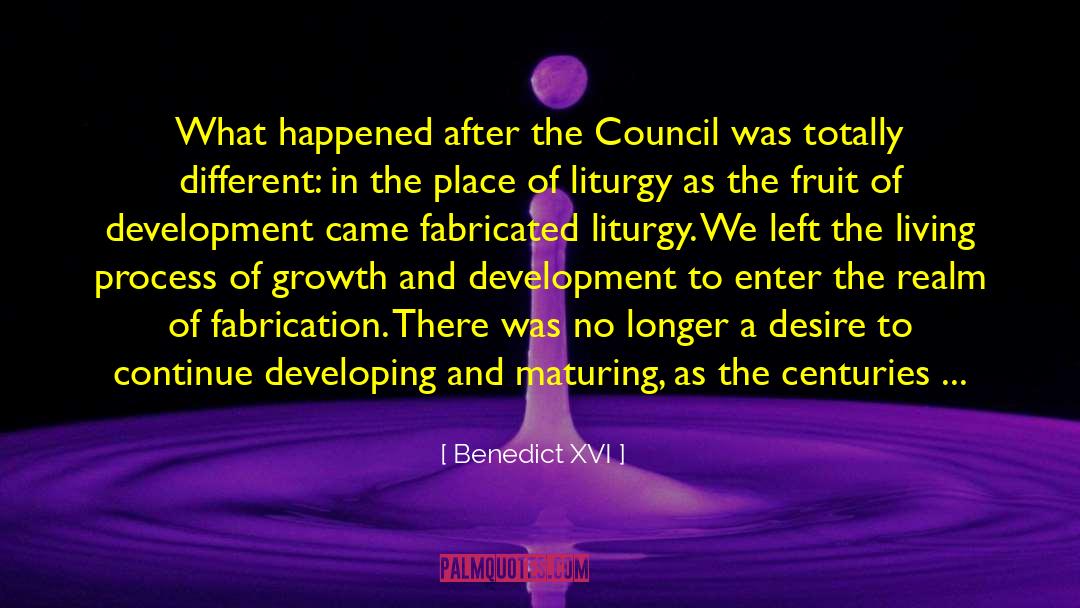
But first let me mention the second aid to understanding provided by science. We know today that in a physical experiment the observer himself enters into the experiment and only by doing so can arrive at a physical experience. This means that there is no such thing as pure objectivity in in physics, that even here the result of the experiment, nature's answer, depends on the question put to it. In the answer there is always a bit of the question and a bit of the questioner himself; it reflects not only nature in itself, in its pure objectivity, but also gives back something of man, of what is characteristically ours, a bit of the human subject. This too, mutatis mutandis, is true of the question of God. There is no such thing as a mere observer. There is no such thing as pure objectivity. One can even say that the higher an object stands in human terms, the more it generates the center of individuality; and the more it engages the beholder's individuality, then the smaller the possibility of the mere distancing involved in pure objectivity. Thus, whenever an answer is presented as unemotionally objective, as a statement that finally goes beyond the prejudices of the pious and provides purely factual, scientific information, then it has to be said that the speaker has here fallen victim to self-deception. This kind of objectivity is quite simply denied to man. He cannot ask and exist as a mere observer. He who tries to be a mere observer experiences nothing. Even the reality
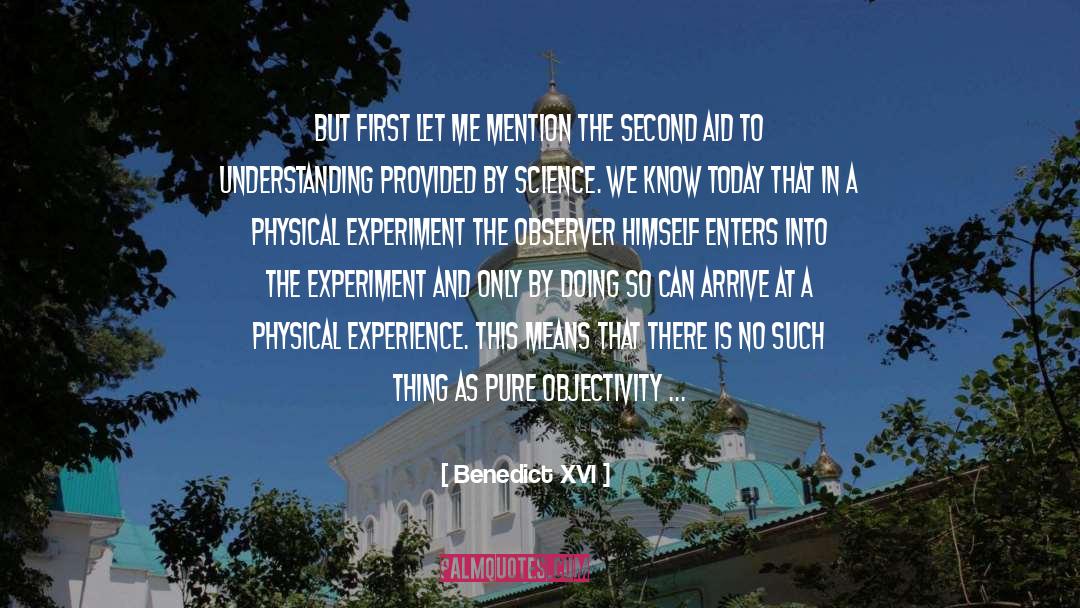
Faith, hope and charity go together. Hope is practised through the virtue of patience, which continues to do good even in the face of apparent failure, and through the virtue of humility, which accepts God's mystery and trusts him even at times of darkness. Faith tells us that God has given his Son for our sakes and gives us the victorious certainty that it is really true: God is love! It thus transforms our impatience and our doubts into the sure hope that God holds the world in his hands and that, as the dramatic imagery of the end of the Book of Revelation points out, in spite of all darkness he ultimately triumphs in glory. Faith, which sees the love of God revealed in the pierced heart of Jesus on the Cross, gives rise to love. Love is the light - and in the end, the only light - that can always illuminate a world grown dim and give us the courage needed to keep living and working. Love is possible, and we are able to practise it because we are created in the image of God. To experience love and in this way to cause the light of God to enter into the world - this is the invitation I would like to extend with the present Encyclical.
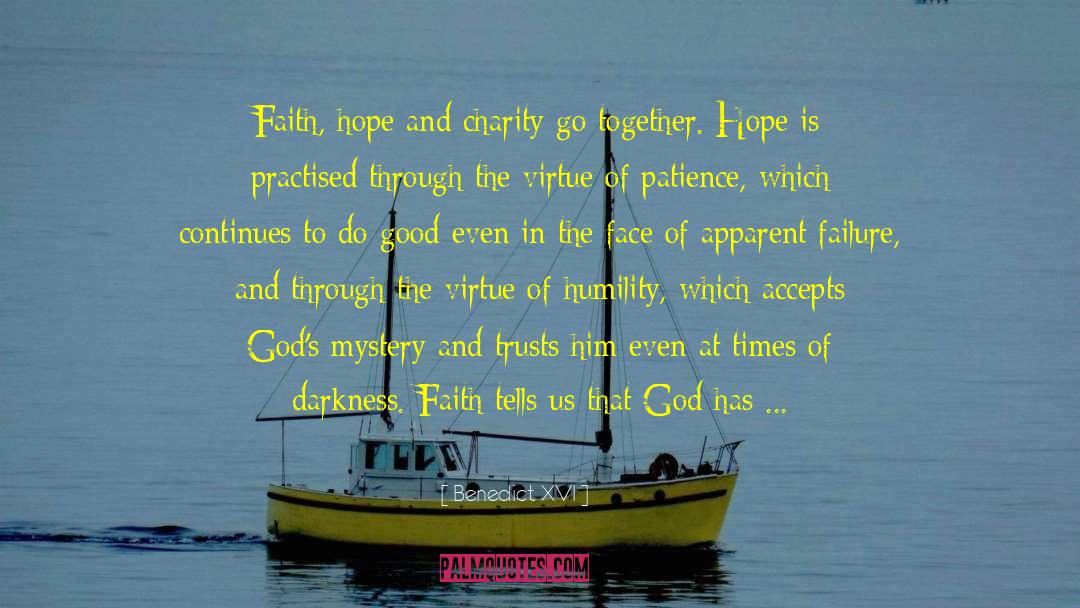
In the course of my intellectual life I experienced very acutely the problem of whether it isn't actually presumptuous to say that we can know the truth - in the face of all our limitations. I also asked myself to what extent it might not be better to suppress this category. In pursuing this question, however, I was able to observe and also to grasp that relinquishing truth doesn't solve anything but, on the contrary, leads to the tyranny of caprice. In that case, the only thing that can remain is really what we decide on and can replace at will. Man is degraded if he can't know truth, if everything, in the final analysis, is just the product of an individual or collective decision.
In this way it became clear to me how important it is that we don't lose the concept of truth, in spite of the menaces and perils that it doubtless carries with it. It has to remain as a central category. As a demand on us that doesn't give us rights but requires, on the contrary, our humility and our obedience and can lead us to the common path.
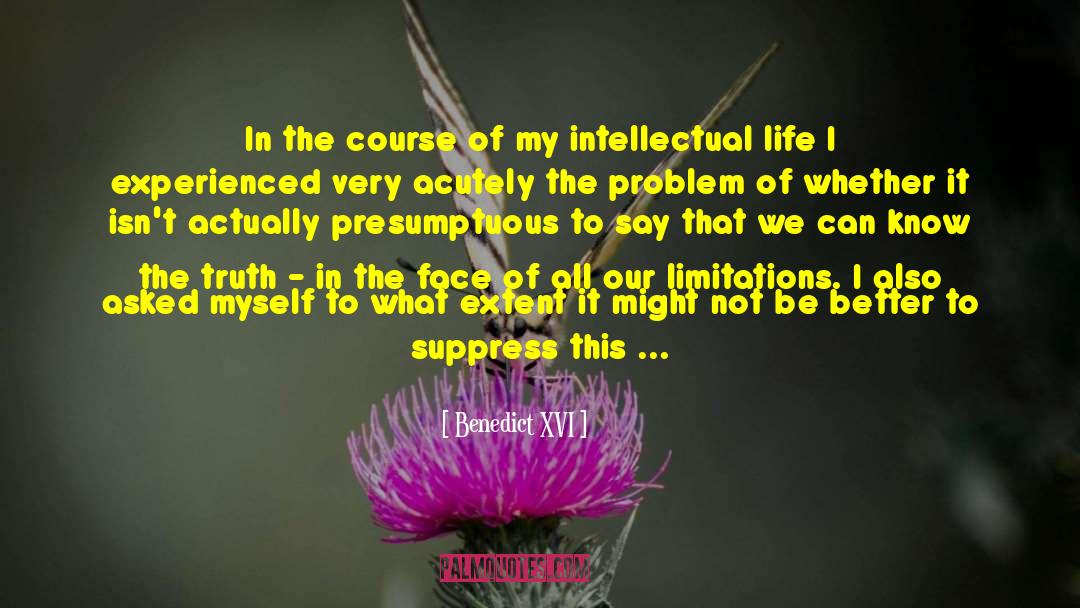
Something I constantly notice is that unembarrassed joy has become rarer. Joy today is increasingly saddled with moral and ideological burdens, so to speak. When someone rejoices, he is afraid of offending against solidarity with the many people who suffer. I don't have any right to rejoice, people think, in a world where there is so much misery, so much injustice.
I can understand that. There is a moral attitude at work here. But this attitude is nonetheless wrong. The loss of joy does not make the world better - and, conversely, refusing joy for the sake of suffering does not help those who suffer. The contrary is true. The world needs people who discover the good, who rejoice in it and thereby derive the impetus and courage to do good. Joy, then, does not break with solidarity. When it is the right kind of joy, when it is not egotistic, when it comes from the perception of the good, then it wants to communicate itself, and it gets passed on. In this connection, it always strikes me that in the poor neighborhoods of, say, South America, one sees many more laughing happy people than among us. Obviously, despite all their misery, they still have the perception of the good to which they cling and in which they can find encouragement and strength.
In this sense we have a new need for that primordial trust which ultimately only faith can give. That the world is basically good, that God is there and is good. That it is good to live and to be a human being. T
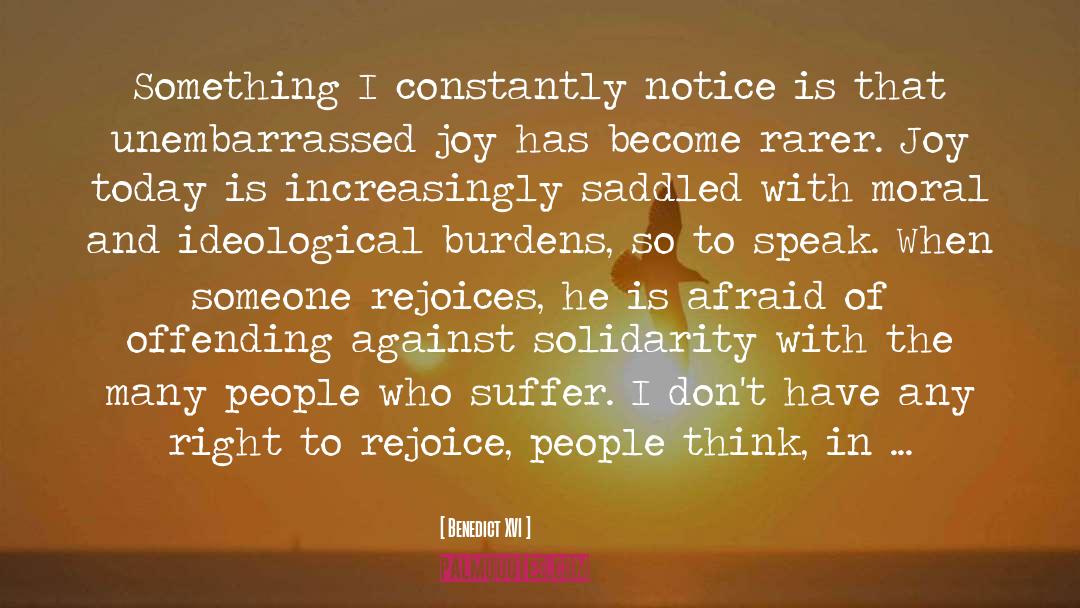
That is why the second coming of the Lord is not only salvation, not only the omega that sets everything right, but also judgment. Indeed at this stage we can actually define the meaning of the talk of judgment. It means precisely this, that the final stage of the world is not the result of a natural current but the result of responsibility that is grounded in freedom. This must be regarded as the key to understanding why the New Testament clings fast, in spite of its message of grace, to the assertion that at the end men are judged "by their works" and that no one can escape giving an account of the way he has lived his life. There is a freedom that is not cancelled out even by grace and, indeed, is brought by it face to face with itself: man's final fate is not forced upon him regardless of the decisions he has made in his life. This assertion is in any case also necessary in order to draw the line between faith and false dogmatism or a false Christian self-confidence. This line alone confirms the equality of men by confirming the identity of their responsibility. ...
Perhaps in the last analysis it is impossible to escape a paradox whose logic is completely disclosed only to the experience of a life based on faith. Anyone who entrusts himself to a life of faith becomes aware that both exist: the radical character of grace that frees helpless man and,no less, the abiding seriousness of the responsibility that summons man day after day. Both together mean that the
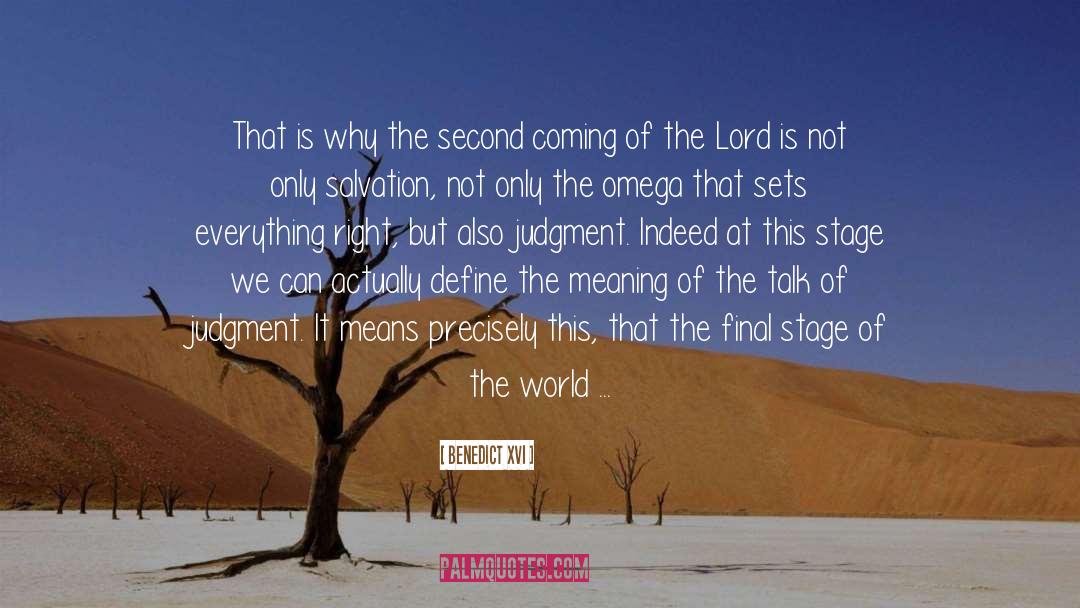
Est autem fides sperandarum substantia rerum, argumentum non apparentium. – Faith is the hypostasis of things hoped for; the proof of things not seen.
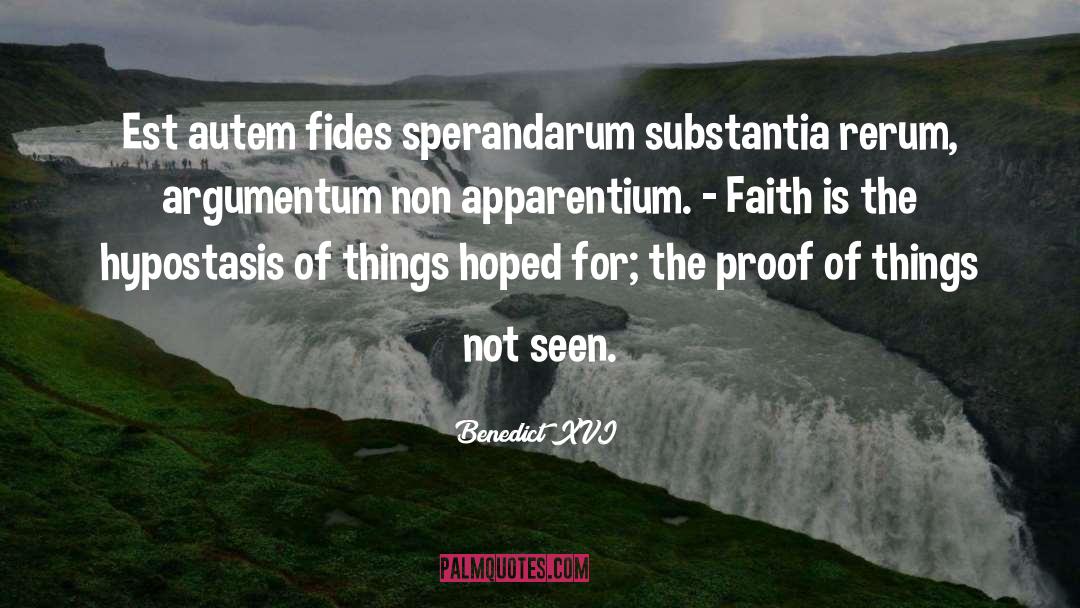
Remaining" is an essential part… What the Church Fathers call perseverantia–patient steadfastness in communion with the Lord amid all the vicissitudes of life–is placed center stage here. Initial enthusiasm is easy. Afterward, though, it is time to stand firm, even along the monotonous desert paths that we are called upon to traverse in this life–with the patience it takes to tread evenly, a patience in which the romanticism of the initial awakening subsides, so that only the deep, pure Yes of faith remains. This is the way to produce good wine.
